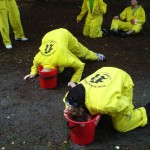How to succeed in interviews—some reflections by an experienced expert reviewer
To succeed in interviews, you need to show genuine interest, stay present in the moment and demonstrate your self-awareness. Professor Helena Jernberg Wiklund shares some of her experience from being an expert reviewer for e.g. Cancerfonden, the Swedish Cancer Society.

As a research group leader in molecular hematology, Professor Jernberg Wiklund focuses on epigenetic mechanisms as a basis for tumor growth and as a target for new therapies.
To take the first, important steps of an scientific career, it is often crucial to make a good impression during interviews. To learn more about how to succeed, we got in touch with Helena Jernberg Wiklund, Professor of Tumor Biology at Uppsala University, Sweden.Through the years, Professor Jernberg Wiklund has gained a substantial experience in performing interviews. Firstly, she is a group leader who recruits scientific talent to the department. Secondly, she is the Director of the Rudbeck Laboratory. Thirdly, she belongs to the expert reviewers for the Senior Investigator Awards program, run by Sweden’s Cancerfonden (i.e. the Cancer Society, one of the major funders of cancer research in the country).
So, why are interviews necessary? The cover letter, the CV, and the enclosed articles should provide the board members with all the information they need, shouldn’t they?
The information provided in the application to Cancerfonden as listed above only constitutes the basis to compile a ranked shortlist of possible candidates for funding. The CV will provide milestones of past performances, but to a lesser extent the strategic decisions, individual contributions, and unique skills of the interviewee to fulfill past and present aims. In selecting the candidate most fit for a position, the face-to-face meeting with the committee will be invaluable to determine
- a) the “untouchable and protected” hedgehog- perspective of the research program
- b) the validity of any proof-of-concept underpinning a formulated hypothesis
- c) the ability of the candidate to make strategic decisions, recruitments and implement relevant models to answer the questions asked in the program.
Intellectual properties, important but hard to document in any CV, are also self-awareness, enthusiasm and driving force of the candidate. Important for successful recruitments including candidates for a research position or funding is awareness and insight of strengths and weaknesses of the present organization, collaborators, and of the candidate him/herself. In an interview situation questions can be asked to determine main focus and driving forces of the applicant, awareness of the feasibility of the project, and importantly, the potential gain for the organization e.g. Cancerfonden to recruit this candidate or fund this program.
On which kind of questions are the applicants most likely to stumble and give a bland or awkward answer?
The candidates are frequently focused on proving his/her knowledge and being interesting. This is often reflected in a historical overview and description of the research field already provided in the application. The organization, e.g. Cancerfonden, on the other hand is focused on exploring the possible input i.e. funding a position or program in this case, and outcome of the recruitment i.e. will this individual share common values with Cancerfonden, be a good representative and give value for the money?
Frequently the applicants has therefore not prepared to answer to why and how a long-term funded position would be life-changing for her/him, whether this position will need a change of research environment, or if successful, how would the research program bring value for the money for the research community, patients and the funding organization i.e. Cancerfonden?
Can you give an example of how an interviewee impressed you?
Interviewees often underestimate their audience. An interviewee will impress me if he/she has acquired relevant knowledge of the review committee and the organization, assume that the committee has read and found the application interesting, and decide to focus the presentation on chosen strategies, threats, achievable aims within the time frame and best scenario outcome of the project if funded.
Give three pieces of advice to applicants who are preparing an interview!
1. Be interested, not only interesting. How can your competence, you skills and personality contribute to the present organization or company? What results can the organization at best expect to gain from hiring or funding you? What do you expect from the position and the organization?
2. Stay focused and present in the moment during the interview. Listen actively and be candide in your answers. Think about this interview as important and possibly life changing and act accordingly.
3. Prepare to answer questions about yourself and your driving forces, as well about decisions that you made in your professional and private life that had either successful or a nondesirable outcome. An impressive CV can never compensate for lack of self-awareness.
- Claire Price of Crastina receives outreach award from Royal Society of Biology - October 25, 2020
- Agile Science student project at Brussels Engineering School ECAM: “We can’t wait to try it again!” - August 28, 2020
- Create an infographic in the Lifeology SciArt Infographic Challenge - June 16, 2020
- Adam Ruben – The scientist that teaches undergraduate students comedy - March 27, 2020
- Sam Gregson, Bad Boy of Science: “Comedy helps to bridge the gap” - March 10, 2020
- The Coolest Science Merchandise of 2019 - December 16, 2019
- Science Media Centre (UK) offers guide on dealing with online harassment in academia - November 26, 2019
- Agile project management taught to students and researchers at Karolinska Institutet - September 20, 2019
- Stefan Jansson: Improve your credibility! (Crastina Column, September 2019) - September 6, 2019
- The People’s Poet: Silke Kramprich, tech communicator - August 31, 2019





Trackbacks & Pingbacks
[…] How to succeed in interviews […]
[…] How to succeed in interviews […]
[…] How to succeed in interviews […]
[…] How to succeed in interviews […]
[…] How to succeed in interviews—some reflections by an experienced expert reviewer […]
[…] How to succed in interviews […]
[…] How to succed in interviews […]
[…] How to succed in interviews […]
[…] How to succeed in interviews—some reflections by an experienced expert reviewer […]
[…] How to succed in interviews […]
[…] How to succeed in interviews—some reflections by an experienced expert reviewer […]
Leave a Reply
Want to join the discussion?Feel free to contribute!